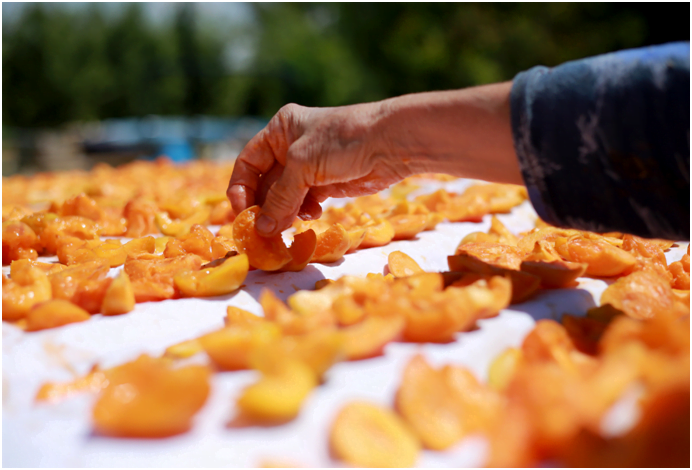Improving apricot production and processing in Tajikistan expands its geography of supplies. Exports of dried apricots have reached 50,000 tons in just several years. These facts were announced by Lutfullo Ortikov, the founder of the fruit production company Fruits Valley, during the national online conference “Apricot business in Tajikistan: efficiency of production, processing and marketing.”
The event was organized by the EastFruit project with the support of the Food and Agriculture Organization of the United Nations (FAO) and the European Bank for Reconstruction and Development (EBRD). The partner of the event was the agro-media agency Sapieza.
“Tajikistan is one of the largest suppliers of dried apricots in the world. There are many varieties of apricots in Tajikistan that are used for drying. We started exporting dried apricots not only to traditional markets but also to developed markets,” said Lutfullo Ortikov.
According to the Fruits Valley founder, apricots in Tajikistan are traditionally dried under the sun: “Not every farmer is ready to dry an apricot in nature in a clean area. It is not so easy to organize this process competently. Ideally, we work with our farmers and suppliers to train them in accordance with the requirements of clients in the EU and the United States.”
Exports of dried apricot products
“The main export volume is in industrial dried apricots (30-35%), which we sell in traditional markets in Russia, Ukraine, and Belarus.
Uryuk (dried apricots with kernels) are a small and usually second-grade variety (industrial apricot). They are bought for compote mixtures and makeup 20% of exports. Their sales markets are to Russia, Ukraine, Belarus, Kazakhstan, the United States, and China.
Kuraga (dried apricots without kernels and of extra quality made of the Babai variety) are exported in a more expensive category. They are similar to Turkish dried apricots. Their sales markets are in Russia, Ukraine, Belarus, Kazakhstan, the United States, Poland, and Germany.
Iranians buy sweet kuraga (with sugar inside) in large quantities before Ramadan. They use it in a sacred place,” said Mr Ortikov.
He added that apricot kernels are a promising product that could open up new markets. “We already have contracts with Germany and we have started to supply this product to Italy.”
Read also: Global prices for fresh and dried apricots consistently decreasing, quality requirements increasing
Product packaging for the EU
The Fruits Valley company supplies products to the EU in large packages. “We do not use packing because of certain nuances. They do not trust us so they do the packing themselves on the spot. We send products in boxes and in bags without labels or stickers. The EU asks for a lot of documentation on the availability of packaging materials for food use and must not use metal staples in boxes,” explained the founder.
Labelling and logistics
Lutfullo Ortikov also paid attention to the question about labelling. According to him, each country has its own labelling requirements for each specific product both per unit of goods and per pallet. For example, the labels on products sent to Ukraine must be translated into Ukrainian.
“Deliveries from Tajikistan to EU countries are carried out by land transport to the buyer’s warehouse. The cost of delivery to the EU is on average $4,000,” he said.
A final takeaway by Mr Ortikov during the conference was the importance of creating a transparent supply chain. The end consumer must know the background of the product such as how the product was grown at what intervals and with what drugs it was processed.
You can watch the video below for more information on Fruits Valley’s experience of exporting dried apricots to the EU and US markets:
The use of the site materials is free if there is a direct and open for search engines hyperlink to a specific publication of the East-Fruit.com website.




